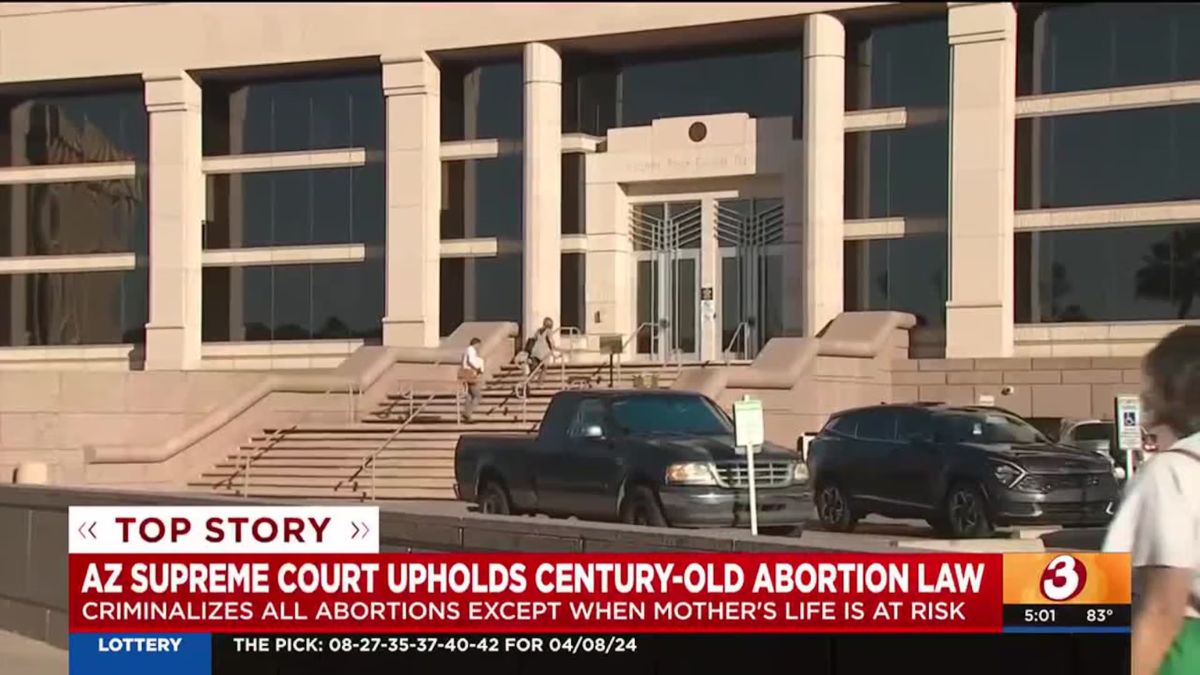The Arizona Supreme Court has found that a near-total abortion restriction, part of 158-year-old legislation, is enforceable.
In a 4-2 decision on Tuesday, the state’s Supreme Court upheld Civil War-era legislation that criminalizes abortions and those who assist a woman in obtaining one, with exceptions for life-saving circumstances. The law defines it as a felony punishable by two to five years in prison.
The state high court has been debating whether to reinstate the legislation, which was passed 50 years before Arizona achieved statehood, or to adopt a 2022 statute that prohibits abortions after 15 weeks unless medically required to preserve a woman’s life.
The prohibition will take effect after 14 days.
Anti-abortion campaigners contended that the text in the two laws clashed and that the state should obey the 1864 law.
It was a highly anticipated ruling in the battleground state, with abortion shaping up to be a critical issue for voters in November. Both Democrats and Republicans have used abortion as a topic to promote their respective candidates.
President Joe Biden has defended abortion rights, accusing Republicans, including former President Donald Trump, of repealing federal protections.
In a statement, he described Tuesday’s decision as the consequence of “the extreme agenda of Republican-elected officials who are committed to ripping away women’s freedom.” He stated that he would continue to fight for reproductive rights.
Meanwhile, Mr. Trump has taken a cautious approach to abortion. Just last week, he claimed credit for overturning Roe v. Wade but refused to support a national ban, stating that the decision should be left to the states.
In November, Arizona voters might vote on an amendment that would protect the right to abortion for up to 24 weeks.
Since the US Supreme Court repealed Roe v. Wade in 2021, abortion availability in the Grand Canyon state has been and continues to be unpredictable for medical professionals and people seeking abortion.
The Republican-majority state legislature imposed the 15-week prohibition months before the judgment, anticipating the Supreme Court’s decision, instead of amending the 1864 legislation that Roe overturned in 1973.
However, the overruling of Roe led to the implementation of the 1864 legislation. Planned Parenthood Arizona disputed the judgment, and the state appellate court affirmed the 15-week limit, sparking a controversy over which legislation should take precedent.
The California Supreme Court heard oral arguments in December. Abortion rights organizations warned that a decision in favor of the Civil War-era rule would jeopardize access to reproductive health care, urging the court to uphold the order, which allows abortions up to 15 weeks.
However, anti-abortion groups petitioned the Arizona Supreme Court to reinstate the 158-year-old ban.
In its judgment, the court stated that “the legislature perhaps got more than it expected when Dobbs overruled Roe” and speculated that most legislators would have added trigger language if they knew the 1864 statute would go into effect.
“But the legislature did not state that intent in any statute or session law, and we should not speculate about what it would have done,” the authors of the majority opinion said.
The Arizona judges stated that Planned Parenthood v. Mayes could be sent to lower courts for additional litigation.
According to Angela Florez, President and CEO of Planned Parenthood Arizona, the verdict “sends Arizona back nearly 150 years” and “will cause long-lasting detrimental harms for our communities.”

